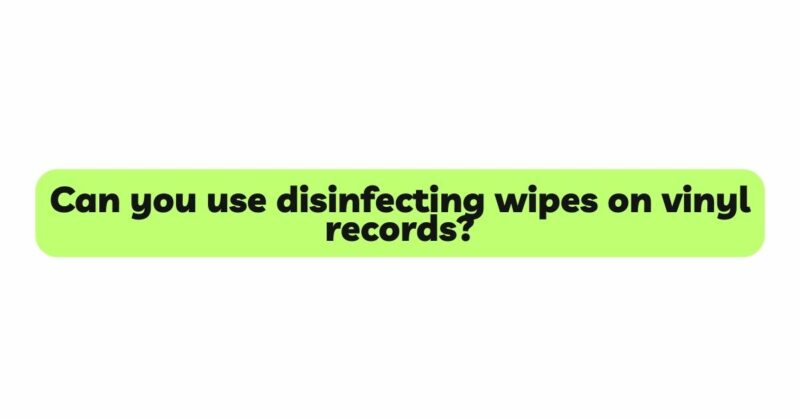In the wake of global health concerns and the ongoing pandemic, the importance of maintaining a hygienic environment has become more critical than ever. People have become vigilant about disinfecting frequently touched surfaces, including their belongings. For vinyl record enthusiasts, the question of using disinfecting wipes on their cherished collections has become a topic of interest. While the desire to keep records clean and germ-free is understandable, the application of disinfecting wipes on vinyl requires careful consideration due to the delicate nature of the medium. In this article, we will explore the potential risks and benefits of using disinfecting wipes on vinyl records, examine alternative cleaning methods, and provide expert recommendations to help you make an informed decision.
- Understanding the Vulnerability of Vinyl Records
Vinyl records are made from a soft and delicate material known as polyvinyl chloride (PVC). The grooves on the record surface contain the audio information that is read by the stylus during playback. Any damage to the record, such as scratches, warping, or residue, can lead to permanent sound quality deterioration and compromise the listening experience.
- Importance of Hygiene: Can Vinyl Records Harbor Germs?
Vinyl records are not immune to collecting dust, dirt, and grime, which can negatively impact sound quality. However, concerns about the potential for vinyl records to harbor germs and viruses, particularly during a pandemic, have led to a growing interest in disinfecting solutions.
- The Pros and Cons of Using Disinfecting Wipes
Pros:
- Convenience: Disinfecting wipes are readily available and easy to use, making them a convenient option for quick cleaning.
- Germ Elimination: Proper disinfecting wipes can effectively eliminate germs, bacteria, and viruses from the record surface.
Cons:
- Harsh Chemicals: Many disinfecting wipes contain harsh chemicals, such as alcohol or bleach, that can damage the vinyl’s surface and alter the record’s sound quality.
- Residue Build-up: Wipes may leave residue on the record, leading to increased static and attracting more dust and debris.
- Label Damage: Improper use of disinfecting wipes can result in damage to the record label, affecting its appearance and value.
- Increased Wear: Frequent use of disinfecting wipes can lead to accelerated wear and tear on the vinyl, reducing its lifespan.
- Expert Recommendations on Disinfecting Vinyl Records
Vinyl record experts and manufacturers generally advise against using disinfecting wipes on records due to the potential risks associated with the harsh chemicals. Instead, they recommend adopting gentler cleaning methods that will effectively clean the record while preserving its integrity.
- Gentle Cleaning Alternatives
a. Dry Brushing: Use a soft anti-static brush or a carbon fiber brush to remove surface dust and debris. Gently run the brush along the grooves in the same direction as the stylus travels.
b. Wet Cleaning: Invest in a vinyl record cleaning solution and a record cleaning brush specifically designed for wet cleaning. Apply a small amount of the cleaning solution to the brush and gently clean the surface in circular motions. Rinse the brush regularly and let the record air-dry vertically.
c. Record Cleaning Machines: For enthusiasts with a large vinyl collection, investing in a record cleaning machine can be a worthwhile option. These machines use a combination of brushes and vacuum suction to clean the records effectively.
- Preventive Measures: Protective Outer Sleeves
To minimize the need for frequent cleaning, consider using high-quality, anti-static inner sleeves to protect the record’s surface from dust and debris. Additionally, invest in protective outer sleeves to shield the album covers from wear and tear.
- Maintaining a Clean Environment
Another essential aspect of vinyl record care is maintaining a clean environment. Regularly dust and clean the area where you store and play your records. Keep your hands clean before handling records to reduce the transfer of dirt and oils onto the vinyl surface.
Conclusion
While the desire to disinfect vinyl records and maintain a germ-free environment is understandable, using disinfecting wipes on vinyl is not recommended due to the potential risks of damaging the delicate medium. Vinyl records require gentle cleaning methods to preserve their sound quality and longevity. Dry brushing and wet cleaning with appropriate solutions and brushes are safe and effective alternatives to keep your vinyl collection clean and well-maintained.
Remember that preventing dirt and dust from accumulating on your records is key to maintaining their integrity. By investing in inner and outer protective sleeves and keeping your environment clean, you can enjoy your vinyl collection without compromising its sound quality or exposing it to potential damage from harsh cleaning agents. Following expert recommendations will help you strike the right balance between maintaining hygiene and preserving your beloved vinyl records for years to come.


